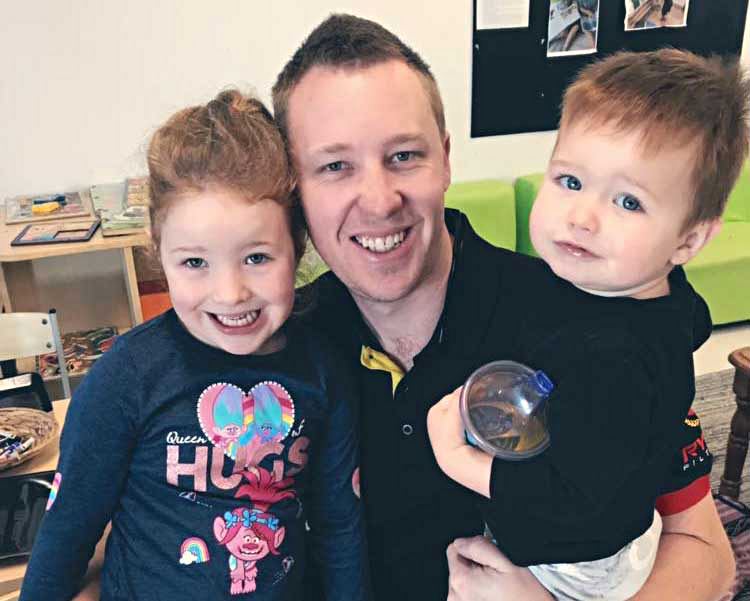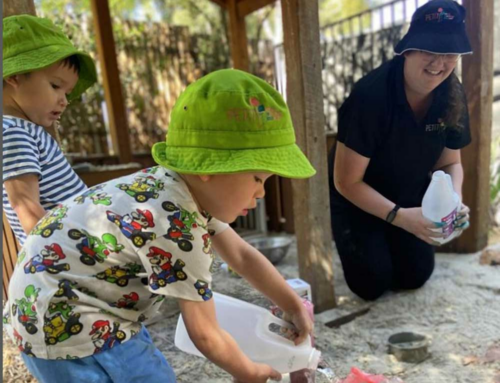Collaborative partnerships with families are essential to providing high-quality care in early childhood education and care. Grounded in Quality Area 6 of the National Quality Standards (NQS), collaborative partnerships call for open, honest and respectful communication.
A child’s first experiences and interactions shape the world they see. With this in mind, families are children’s first teachers, and as Educators, our role is to work with families to support a shared vision of learning and growth. The relationships we develop with families benefit the children.
Partnerships with families are most effective when Educators engage families in shared decision making. Likewise, families benefit most when they can connect and share information. Our Educators listen and learn to find out what is important to families to help meet their needs.
As Educators, our role is to provide families with direct support and help them discover ways to meet their needs. When we build collaborative partnerships with families, we empower them to give their child the best start in life.
In this article, Sarah Rothberg, Centre Director at Petit Early Learning Journey Coffs Harbour, discusses the benefits of partnering with families and how to approach a collaborative partnership that benefits children. Sarah discusses:
- Why collaborative partnerships are important.
- Approaches to working collaboratively with families.
- Enhancing pedagogy and curriculum through family partnerships.
- How Educators can support each other in building collaborative partnerships with families.

Why is it important to collaborate with families?
It’s important to recognise the central role families play in children’s lives. At Petit ELJ, we see every family as unique with different values, experiences and priorities. In the same way, our partnerships are also unique. We respond to every family’s situation with respect and understanding.
“At Petit ELJ, we believe that partnering with families fosters strong reciprocal relationships,” says Sarah. “It’s one of our six core beliefs that we strategise with families and we reflect on this topic regularly as a team. We feel it is important to collaborate with families to:
- Ensure all families feel welcome, safe, connected and have a sense of belonging to our service’s community.
- Show our respect, as they have entrusted us with the care and education of their children.
- Develop a shared vision to support each child to reach their fullest potential.
- Share ideas, work together towards goals and engage families in decision making.
- Assist families in developing their own network of resources.
- Share experiences.
- Respect diversity and difference.
- Benefit the children.“

How can Educators work collaboratively with families?
“Communication is key to building collaborative partnerships with families. From the first interaction, open communication is essential.”
“By being effective listeners and taking the time to hear the stories the children and their families bring to our service, we develop a rich understanding of their experience and cultural difference.”
“As Educators, we work collaboratively with families by being responsive, respectful and open to their differences, culture and beliefs. Our strong relationships with families encourage children to try new experiences as they feel safe, secure and supported in our care.”
Sharing information by using a range of styles and communication is essential in effective collaborative partnerships with families. At Petit ELJ, we encourage communication through:
- Conversations at drop-offs and pick-ups.
- Shared communication boards and diaries.
- Family Handbook.
- Interactions through Storypark.
- Information nights.
- A space in our entrance for families to provide feedback and ideas.
- One-on-one consultation sessions when required.
- Emails and phone calls.
- Social media posts.
- Our monthly family eNewsletter.
- Regular surveys to receive feedback on quality improvement.
- Individual meetings for extra support for any family or child that require it. This is done in a safe, respectful and nurturing space.
“There have been instances where we have noticed that the emotional support strategies that have worked in the past with a child weren’t working as effectively now. Recently we decided that a meeting with a family was important.”
“Families generally welcome these meetings. In a recent instance the family had noticed a decline in the child’s emotional wellbeing at home, as well, and we were able to connect the family with professional support in our community. “
“We also provided the family with documentation of our observations to help the child get extra support. Through this shared collaboration, we worked together with the child and family to give support and guidance.”
“The sharing of our knowledge, skills and ideas with families provides consistency when it comes to child development and wellbeing,” says Sarah. “In collaborative partnerships with families, it’s essential to support a family’s choices, respect their diversity and uniqueness.”

How do you engage families in their children’s learning?
“Our Learning Program sparks engagement from families through daily communication, by sharing our intentions and through interactions with group and individual learning stories.”
“Through our open communication, we hope our families feel that they can engage in our program at any stage. We invite families to share their cultural events with us and participate in special activities for national events like ANZAC Day. We also encourage families to support our community engagements, passion projects and fundraisers.”
“Our environments also promote family participation and communication. Recent changes to our outdoor and indoor environments created an inviting atmosphere. Wooden floors and soft furnishings encourage families to relax and participate with their children.”
“We have also recently started a preschool information night. It encourages families to connect and invites open communication. It provides a place for families to share ideas.”

How does your team build collaborative partnerships with families?
“We have regular meetings and professional development to reflect on and enhance our knowledge of pedagogy. We share ideas on the most positive ways to communicate with families.”
“Our team also brainstormed a set of guidelines to use when communicating with families. It promotes consistent positive interactions, even if we have to talk about something difficult to share.”
“Building a sense of professionalism and what this means for our service is key to promoting effective communication and strong collaborative partnerships with families.”

Build collaborative partnerships with families at Petit Early Learning Journey
At Petit ELJ, our first interaction with families and every interaction after that matters. We believe that the most crucial aspect of our collaborative partnership with families is listening, taking time to understand and working with families on things that matter most to them.
Building collaborative partnerships with families require strong communication skills. It also requires Educators to show respect and have a non-judgemental and honest approach to every family’s situation. We respect their uniqueness and support our families’ choices.
Do you have a genuine desire to promote open and honest communication with families and their children? We’re seeking family-centred Educators to actively engage with our families in planning for their children’s ongoing learning and development.






